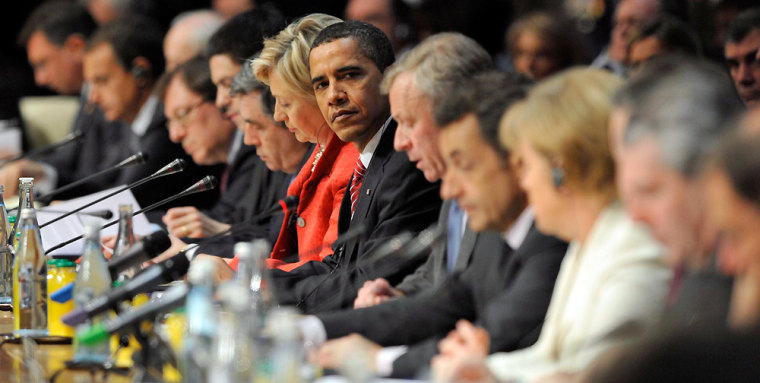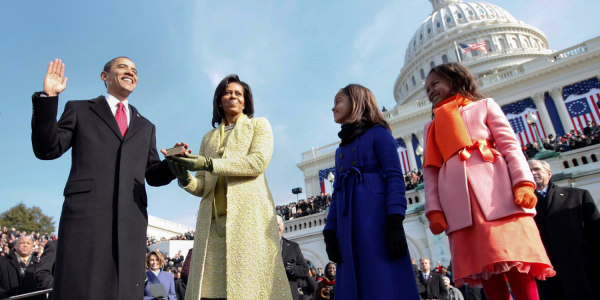European leaders enthusiastically praised President Barack Obama's new Afghan strategy at a NATO summit Saturday but held their ground on a central disagreement and offered only military trainers and extra security forces for upcoming elections.
Violent anti-war protests that marred the alliance's 60th anniversary celebrations were a stark reminder that much of Europe has no appetite for the other, costlier half of Obama's Afghan equation: more combat troops.
"I am pleased that our NATO allies pledged their strong and unanimous support for our new strategy," Obama said. "We'll need more resources and a sustained effort to achieve our ultimate goals."
As protesters battled police outside, NATO risked angering Muslims around the world by giving the post of secretary-general to the prime minister of Denmark, who fueled anger three years ago by backing a Danish newspaper's right to publish cartoons of the Prophet Muhammad. The 28 leaders at the summit also approved measures to repair ties with Russia — virtually frozen since the Russo-Georgian war in August.
Afghanistan is seen as a crucial test of the power and relevance of the alliance, which was founded at the height of the Cold War to counterbalance the Soviet Union and now is struggling against a rising insurgency far beyond its borders.
The escalating war has highlighted doubts in Europe about the ability of NATO's 58,000 troops to stem the Taliban insurgency. Worries about casualties and costs have contributed to opposition to a conflict many Europeans see as an unnecessary distraction during economic crisis.
Despite a security crackdown on both sides of the Franco-German border, thousands of anti-war protesters fought running street battles with police, setting ablaze a hotel and a customs post and forcing the leaders' spouses to cancel a visit to a nearby cancer hospital.
During the summit, jointly co-hosted by France and Germany as a symbol of European unity, Obama briefed NATO leaders about his new strategy aimed at stabilizing Afghanistan while rooting out Taliban and al-Qaida hard-liners in both Afghanistan and Pakistan.
After the meeting, Obama heralded what he called "concrete commitments" from NATO allies on Afghanistan, saying their agreement to send up to 5,000 more trainers and police was "a strong down payment" toward securing the country.
Obama's new strategy has him adding 21,000 U.S. troops to an American force of 38,000.
The White House said NATO countries agreed to send 3,000 personnel on short-term deployments, to help stabilize Afghanistan before elections in August. An additional 1,400 to 2,000 will provide training for Afghanistan's national army.
NATO's outgoing Secretary-General Jaap de Hoop Scheffer said the alliance would set up a trust fund for the Afghan National Army, and provide monitoring and liaison teams that would work with Afghanistan's fledgling security forces.
Slideshow 38 photos
First 100 days
The alliance must ensure "no more terrorist danger emanates from Afghanistan," German Chancellor Angela Merle said.
British Prime Minister Gordon Brown echoed Obama's argument that Afghanistan was key to Europe's security.
"Now we are working to build a successful, democratic Afghanistan and that will be that our streets will be safer in Britain," he said. "With important presidential elections to come in the next few months we must not allow the Taliban to disrupt the democratic process."
It was not immediately clear how the selection of Danish Prime Minister Anders Fogh Rasmussen would effect the war effort. Fogh Rasmussen's candidacy for NATO's top civilian post was initially opposed by Turkey, whose leaders pointed out that the choice would antagonize predominantly Muslim Afghanistan and Pakistan.
Fogh Rasmussen appeared arrogant to many Muslims, when he refused to apologize for the 12 drawings of the Prophet Muhammad — including one of which showed the prophet wearing a turban shaped as a bomb — that sparked angry protests in 2006 throughout the Middle East and South Asia.
NATO said it had agree to address various Turkish "concerns." Turkey said its requests had included the closure of a Kurdish satellite television broadcaster based in Denmark; the establishment of contacts between NATO and Islamic countries; appointment of a Turk as an aide to Fogh Rasmussen, and senior NATO command positions for Turkish generals.
Fogh Rasmussen denied making undue concessions to the Turks, and pledged to improve relations between NATO and the Muslim world.
"I will make a very clear outreach to the Muslim world and do my utmost to ensure a positive cooperation and intensified dialogue with Muslim countries," he told a news conference after the summit.
Nine months after relations frayed over Moscow's invasion of Georgia, Russia has become an important element in NATO's Afghan war plans. Repeated Taliban attacks on NATO logistics convoys in Pakistan have made southern resupply of the international forces in landlocked Afghanistan increasingly hazardous.
Moscow, which also worries about the spread of Islamic fundamentalism in Central Asia, has offered its road and rail network as an alternate overland supply route.
A summit statement said leaders decided to resume the work of the NATO-Russia Council — a joint body whose work was suspended after the war in Georgia. It said a meeting with Russia's foreign minister would be held soon.
The alliance also officially recognized France's return to full participation on NATO's military councils after a 43-year absence, and welcomed Albania and Croatia as its newest members.
Looking to the future, the leaders issued a declaration Saturday that formally launches the creation of a new "strategic concept" or road map to define NATO's roles, missions and way of functioning.
It would be the first such revision of the alliance's purpose and function since 1999.

